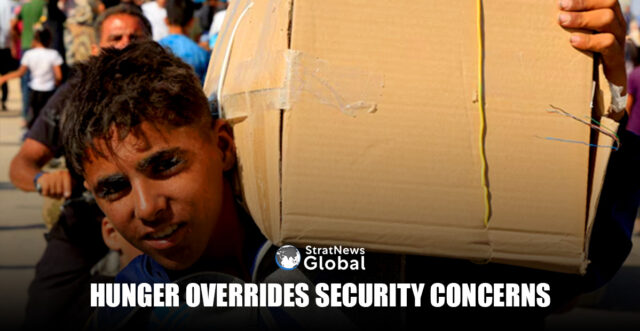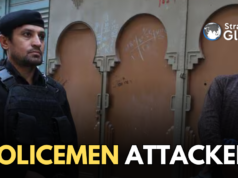Hundreds of Palestinians on Tuesday rushed to aid distribution sites run by a U.S.- and Israel-backed foundation, driven by desperation for food despite concerns over biometric and other checks announced by Israel.
By late afternoon on Tuesday, The Gaza Humanitarian Foundation, said it had distributed about 8,000 food boxes, equivalent to about 462,000 meals, after an almost three-month Israeli blockade of the enclave.
Hundreds of Palestinians, including women and children, some on foot or in donkey carts, flocked towards one of the distribution sites in the southern city of Rafah, which is under full Israeli army control, to receive food packages.
Footage, which Reuters could not immediately verify, showed lines of people walking through a wire-off corridor and into a large open field where aid was stacked. Later, images shared on social media showed large parts of the fence torn down as people jostled their way onto the site.
“What happened today is conclusive evidence of the occupation’s failure to manage the humanitarian crisis it deliberately created through a policy of starvation, siege, and bombing,” the Hamas-run government media office said in a statement.
Some of the recipients showed the content of the packages, which included some rice, flour, canned beans, pasta, olive oil, biscuits and sugar.
Although the aid was available on Monday, Palestinians appeared to have heeded warnings, including from Hamas, about biometric screening procedures employed at the foundation’s aid distribution sites.
“As much as I want to go because I am hungry and my children are hungry, I am afraid,” said Abu Ahmed, 55, a father of seven. “I am so scared because they said the company belongs to Israel and is a mercenary, and also because the resistance (Hamas) said not to go,” he said in a message on the chat app WhatsApp.
Israel says the Switzerland-based GHF is a U.S.-backed initiative and that its forces will not be involved in the distribution points where food will be handed out.
But its endorsement of the plan, which resembles Israeli schemes floated previously, and its closeness with the U.S. have led many to question the neutrality of the foundation, including its own former chief, who resigned unexpectedly on Sunday.
The Israeli military said four aid sites have been established in recent weeks across the enclave, and that two of them in the area of Rafah began operations on Tuesday and “are distributing food packages to thousands of families in the Gaza Strip.”
Screening Recipients
Israeli officials said one of the advantages of the new aid system is the opportunity to screen recipients to exclude anyone found to be connected with Hamas.
Humanitarian groups briefed on the foundation’s plans say anyone accessing aid will have to submit to facial recognition technology that many Palestinians fear will end up in Israeli hands to be used to track and potentially target them.
Details of exactly how the system will operate have not been made public.
The United Nations and other international aid groups have boycotted the foundation, which they say undermines the principle that humanitarian aid should be distributed independently of the parties to a conflict, based on need.
“Humanitarian assistance must not be politicised or militarised,” said Christian Cardon, chief spokesperson of the International Committee of the Red Cross.
Israel, at war with Gaza’s dominant Hamas militant group since October 2023, imposed the blockade in early March, accusing Hamas of stealing supplies and using them to entrench its position. Hamas has denied such accusations.
Begging For Bread
Hamas, which has in recent months faced protests by many Palestinians who want the devastating war to end, has also warned residents against accessing GHF sites, saying Israel was using the company to collect intelligence information.
The launch of the new system came days after Israel eased its blockade, allowing a trickle of aid trucks from international agencies into Gaza last week, including World Food Programme vehicles bringing flour to local bakeries.
But the amount of aid that has entered the densely populated coastal enclave has been only a small fraction of the 500-600 trucks that U.N. agencies estimate are needed every day.
“Before the war, my fridge used to be full of meat, chicken, dairy, soft drinks, everything, and now I am begging for a loaf of bread,” Abu Ahmed told Reuters via a chat app.
As a small aid flow has resumed, Israeli forces – now in control of large parts of Gaza – have kept up attacks on various targets around the enclave, killing 3,901 Palestinians since a two-month-old ceasefire collapsed in mid-March, according to the Gaza health ministry.
In all, more than 54,000 Palestinians have been killed in Israel’s air and ground war, according to Gaza health authorities. It was launched following a cross-border Hamas-led attack on October 7, 2023, that killed some 1,200 people and saw 251 taken hostage in Gaza, by Israeli tallies.
(With inputs from Reuters)





